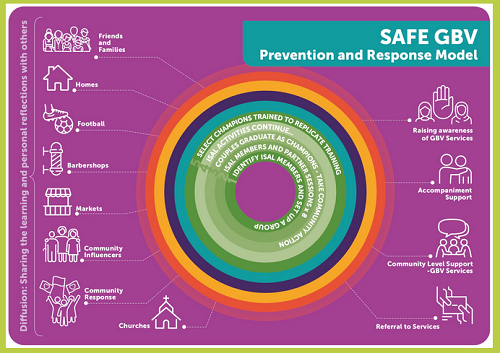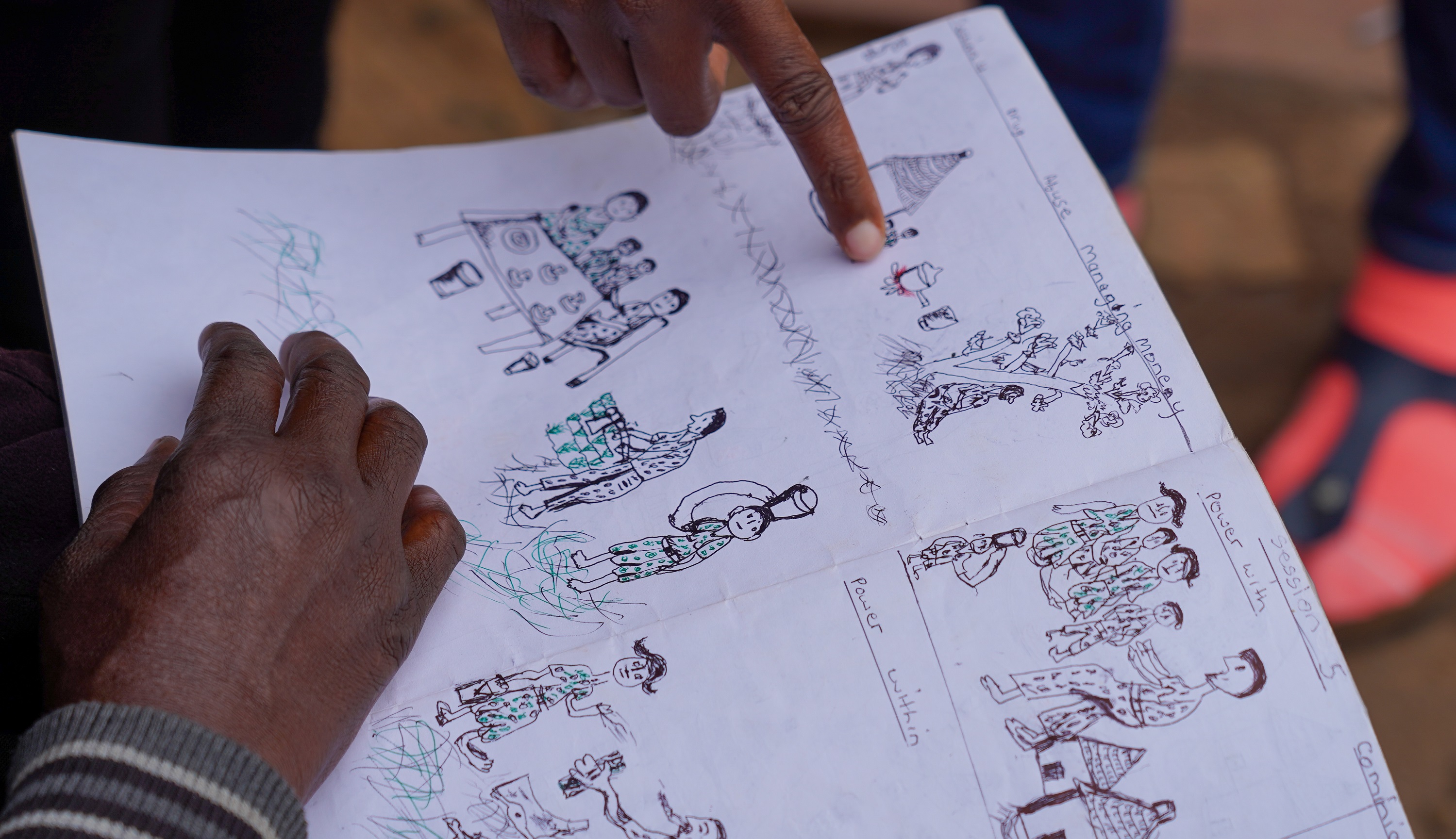Transforming discriminatory gender norms to build food security and reduce gender based violence in Zimbabwe
22 APRIL 2024
As part of its urban cash assistance programming in Zimbabwe, WFP has been offering 'Toose', a gender transformative approach that addresses some of the root causes of intimate partner violence, such as economic instability and harmful social norms.
-and-shingirai-(right)-showcase-their-detergents_wfp_christopher-charamba_crop2.jpg?sfvrsn=b36c8e1b_1)
In the small Lowveld town of Chiredzi, 433 km from Zimbabwe’s capital city, Harare, Shingirai and Gertrude arrange branded buckets, tins, and bottles of detergents ready for the market. They sell to two nearby schools and within their community.
The pair participate in the World Food Programme’s (WFP) urban cash assistance and urban resilience programmes that target food-insecure households to provide immediate relief and build sustainable livelihoods.
In recent years, urban food insecurity has become increasingly prevalent in Zimbabwe, largely due to the country’s economic challenges, characterized by high inflation and rising food costs. Over 1.5 million people in Zimbabwean urban areas are considered cereal insecure.
“The cash assistance was helpful for my family. At the time, I had no job, my husband had left us, and we had few options. The money we received meant I could buy food and meet our basic needs. My family could eat,” Shingirai said.
In food-insecure contexts, the risk of violence against women and girls doubles. That is why WFP and its partners in Chiredzi offer a platform for gender programming that seeks to reduce gender inequality by transforming harmful norms, roles and relations.

“Through research, we have seen that cash transfer programmes can help reduce intimate partner violence if the programme is very thoughtfully designed and if women are the primary recipients,” said WFP’s Elizabeth Van Veen.
“However, it is also important that cash transfer programmes include or are combined with other initiatives because, as we know, gender-based violence is a multifaceted, multi-dimensional challenge,” she added.
In Chiredzi, as part of the urban cash assistance programme, WFP has been offering ‘Toose’ (meaning ‘together’ in Shona), a gender transformative approach that addresses some of the root causes of intimate partner violence, such as economic instability and harmful social norms.
It does so through implementing savings groups combined with a seven-session curriculum that focuses on some of the underlying challenges behind intimate partner violence, such as poor communication and gaps in joint decision-making.
After participating in the urban resilience programme and starting their detergent business, Shingirai and Gertrude chose to join the Toose programme, which helped them grow their business and improve their family dynamics.
“Toose was incredibly impactful for my family. It helped my husband see me differently, not just as his wife, but as an equal partner,” Shingirai said.
“My husband’s views on women also shifted through the different sessions. We can now handle challenges and conflict a lot better in our home,” she added.
-participates-in-a-toose-session-facilitated-by-plan-international-in-chiredzi_wfp_christopher-charamba.jpg?sfvrsn=634cb604_1)
Shingirai (left) participates in a Toose session facilitated by Plan International in Chiredzi.
For Gertrude, the programme significantly improved communication between her and her husband.
“Before we went to the Toose training, I would hesitate to call or message my husband during the day. Try calling, and you’d be met with a stern ‘What do you want?’ or ‘Why are you bothering me?’” she said.
“But now I can call when I want just to check in, or he’ll call me to find out how my day is going.”
Toose workshops are led by a facilitator and employ role play and drawings to express sensitive and complex topics. Every participant receives a book in which they draw their visions and plans, identify and reflect on family life and how to overcome barriers.
“Through Toose, my husband and I have learned to plan better for our future. I was careless with money and spent it frivolously, but the programme helped me see that to achieve our family vision, we must be financially disciplined and plan together," added Gertrude.
-and-gertrude-(standing)-showcase-their-detergents-on-the-veranda-of-their-home-in-chiredzi_wfp_christopher-charamba.jpg?sfvrsn=15b4146e_1)
Shingirai (seated) and Gertrude (standing) showcase their detergents on the veranda of their home in Chiredzi.
In Chiredzi, over a third of households receiving cash assistance have gone through the Toose curriculum. Preliminary learnings from the research partner TetraTech indicate CBT has helped minimize household food insecurity, which, when combined with the Toose curriculum, has reduced intimate partner violence.
“There are specific areas in which cash programming is insufficient. What is exciting about the Toose programme is that it has really helped fill in those gaps and move from simple cash programming towards a gender-transformative, longer-term approach,” Elizabeth shared.
“Research is still ongoing, but preliminary findings illustrate that combining cash with Toose is working to reduce household stress, reduce food insecurity, and improve household cohesion and communication. Participating households have reported a reduction in intimate partner violence.”

Toose participant shares their drawings from one of the sessions.
Toose is one example of the gender transformative methodologies that WFP is adopting in its programmes.
Between 2019 and 2024, the Rome-based Agencies worked together to implement the Joint Programme on Gender Transformative Approaches for Food Security and Nutrition, with financial support from the European Union.
In this context, WFP led country-level activities in Ecuador and Malawi aimed at improving, among other things, women’s access to services and markets, their control over financial resources, and their financial inclusion.
Now, the organization’s country offices are moving beyond the Joint Programme and collaborating with other partners to use their projects, be they cash transfer, food assistance for assets, or post-harvest loss reduction programmes, to spark long-term changes in the agency, the power relations, the social norms, and the laws and policies found in the countries and among beneficiaries.
Shingirai and Gertrude are two of the many people whose lives have been changed thanks to WFP and partners. Their stories serve as evidence of the fact that even the most deep-rooted determinants of gender inequalities can be removed to make space for the seeds of new, equal, beginnings.
WFP collaborates with Plan International, SAFE Partners (ECORYS, Social Development Direct, TetraTech, Musasa, and SAFE Communities) and the UK Foreign, Commonwealth & Development Office to combat gender-based violence in communities with the highest levels of food insecurity. ECORYS, Social Development Direct and the Foreign, Commonwealth & Development Office are the originators of the Toose model.
Click here to learn more about WFP Zimbabwe’s work.
Click here to learn more about the Toose model.
Image credits: ©WFP/Christopher Charamba
Contacts:







